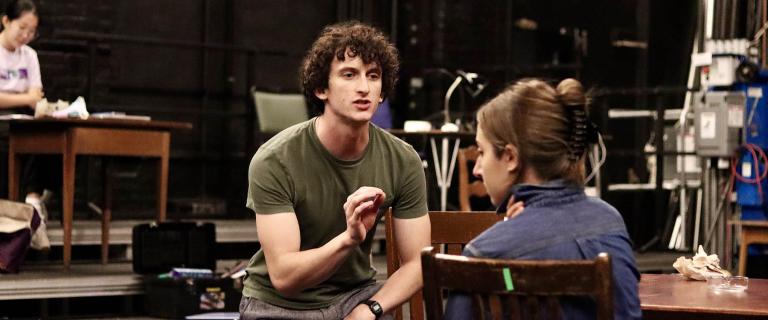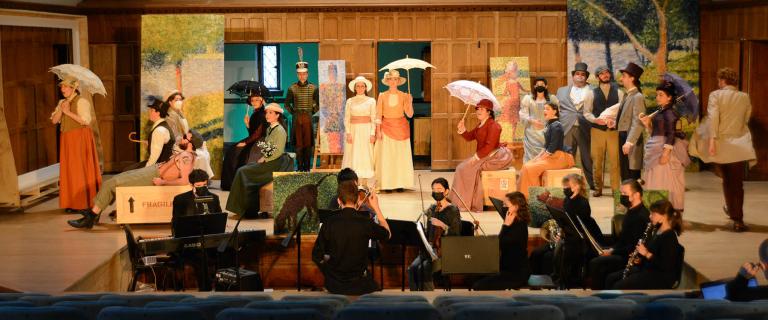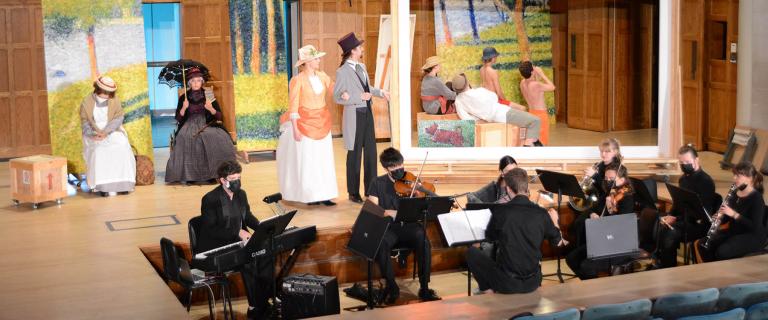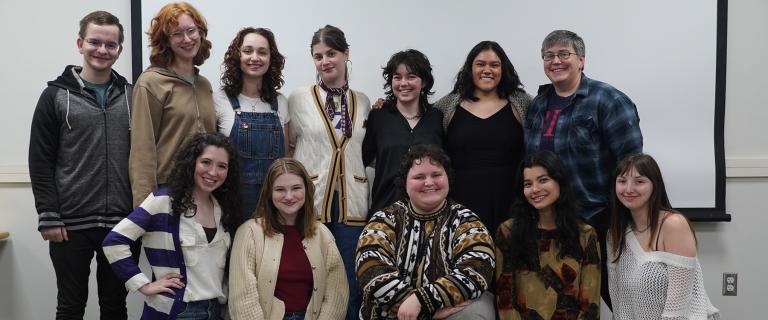Courses and Requirements
Curriculum
The drama curriculum focuses on the study of world theater and literatures from the Greeks through the 21st century as well as hands-on theater making through the art of collaboration. We teach dynamic courses in acting, directing, dramaturgy, design, and playwriting. Our aim is to introduce students to the theoretical and practical dimensions of theater through the encounter of a variety of genres and cultures and to encourage students to generate new work through collective creation.
Drama 102 and 103 give prospective majors a basic understanding of topics ranging from the art of collaboration to theatrical communication, design and technical elements, and essential skills of stagecraft.
Drama 200 allows students to participate directly in departmental productions and thus apply the more theoretical knowledge they obtained in 102 and 103.
In the sophomore year, all majors complete a full-year course on the sources of world drama and begin more intensive study of one or more theatrical skills. This coursework prepares sophomores for more advanced study of both the history and theory of drama and the practical aspects of production.
During the junior and senior years, majors must complete at least two 300-level courses which further develop their understanding of drama and performance studies and their ability to think critically and write effectively about the history and theory of drama. Normally, majors will also continue to participate in departmental productions and to develop their theatrical skills through courses ranging from Drama 302 (Problems in Design) to 382 (Acting for the Camera). Course instructors, as well as those involved in play productions, constantly evaluate students’ progress in developing the theatrical skills explored in each course.
Most senior majors enroll in Drama 390 (Senior Project in Drama). In this course, the student undertakes and completes, with close faculty supervision, a significant project in dramatic literature, theater history, performance studies, acting, directing, design, or playwriting. Students are encouraged to collaborate on a project. Even when undertaking practicum projects in acting, directing, or design, students in 390 must produce a companion research paper of considerable length. In this way, before graduation, each student demonstrates to the faculty his or her ability to think and write about theater, as well as the more practicum skill or skills that he or she has acquired.
Major Requirements
Drama majors study all aspects of theater, from devising work to exploration of the classics. We strongly believe that theory and practice are inseparable. Complex learning, analytical and critical thinking, and collaborative, embodied practice as they are taught in the classroom are tested in a laboratory production environment. The Drama Department curriculum and its Experimental Theater work in tandem. Productions undertaken by the department are curricular in nature.
View Drama Major Requirements in the Vassar College Catalogue.
Important notes
- According to college regulations, no student may take more than half their total courses in the Department of Drama. Typically, this is 16 units for a student who graduates with the required 32 units.
- Students who take a Junior Year Abroad (JYA) in drama may generally count 2 of their credits, with pre-approval by the department, as elective credits.
- Drama 200: “Drama Department Production,” is open to Majors and Non-Majors. The prerequisites for this course are Drama 102 and Drama 103.
First year students are not permitted to participate in production in their first semester.
Non-majors may take Drama 200 one time without completing these prerequisites. Thereafter, these courses must be completed to participate in production.
Prerequisites can be taken concurrently with Drama 200.
Drama 200 may be repeated up to four times. - The drama department does not require a track for graduation. However, in their junior year, students may apply to complete a thesis in production during their senior year. Consideration for a thesis in production is contingent upon the successful completion of a designative prerequisite track. Please meet with your advisor to learn more about these prethesis requirements.
- DRAM 221/222 should be taken by declared or aspiring Drama Majors sequentially in the sophomore year.
- Independent Studies may not be used as a replacement for courses required for the Drama Major.








